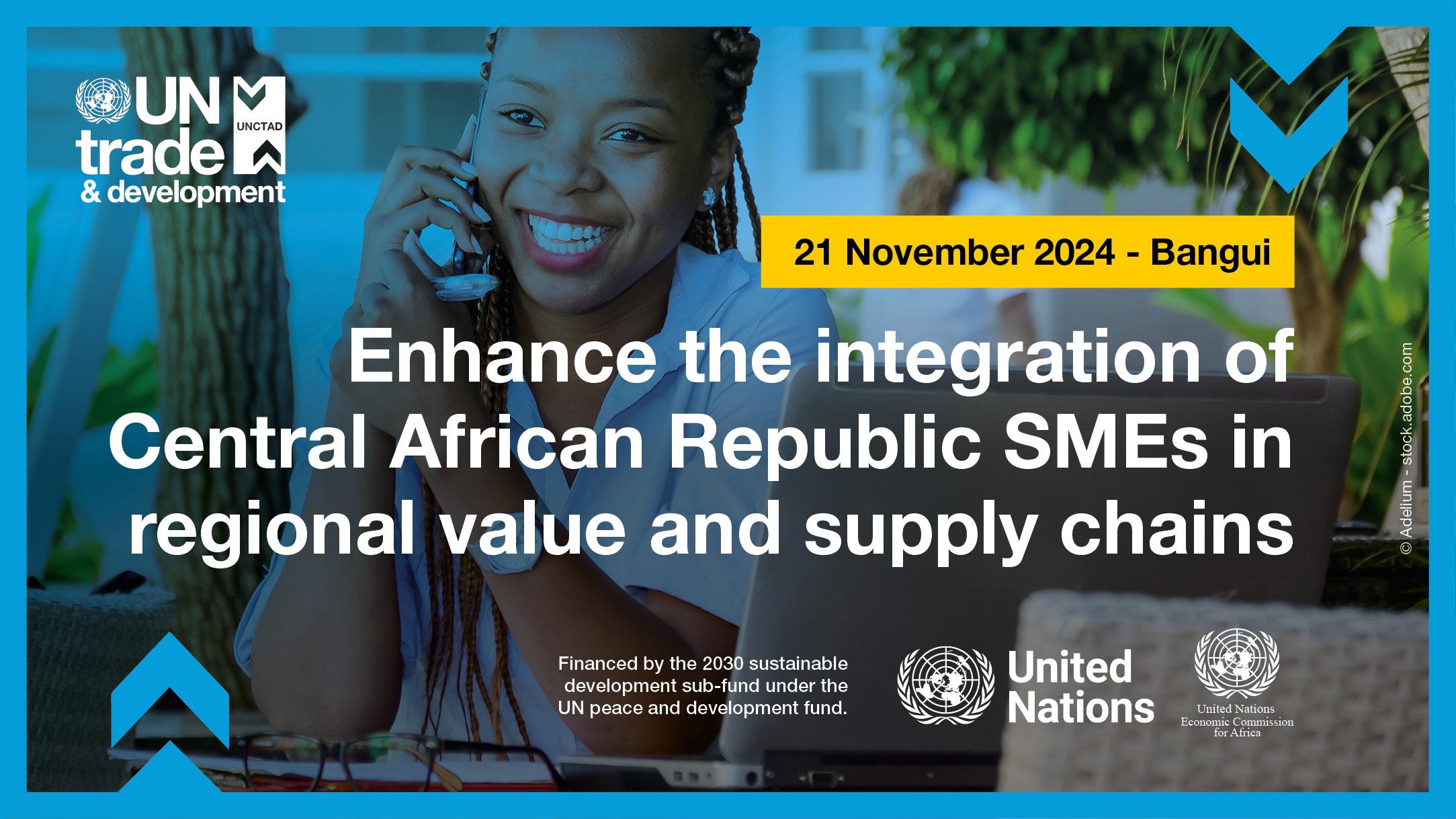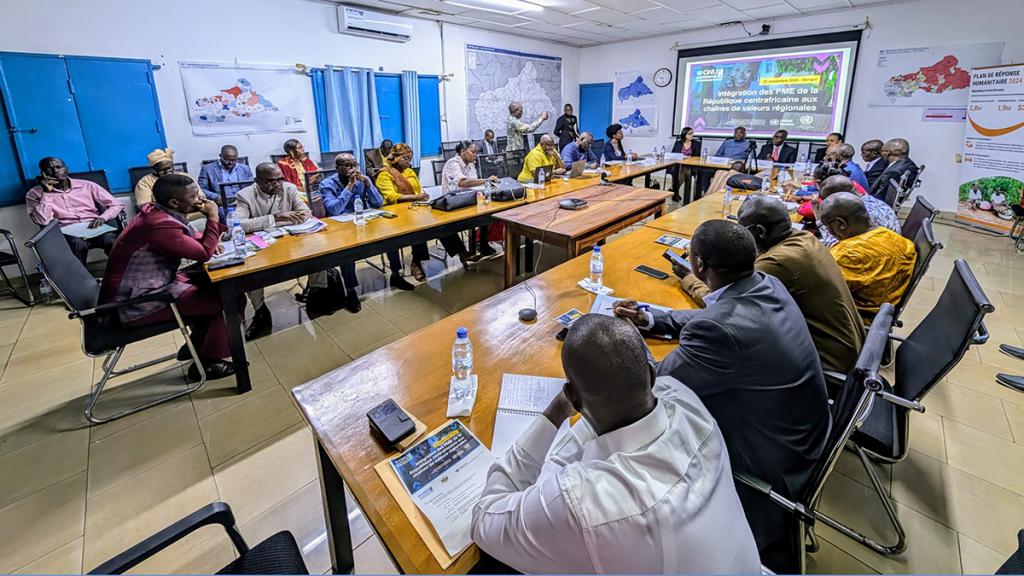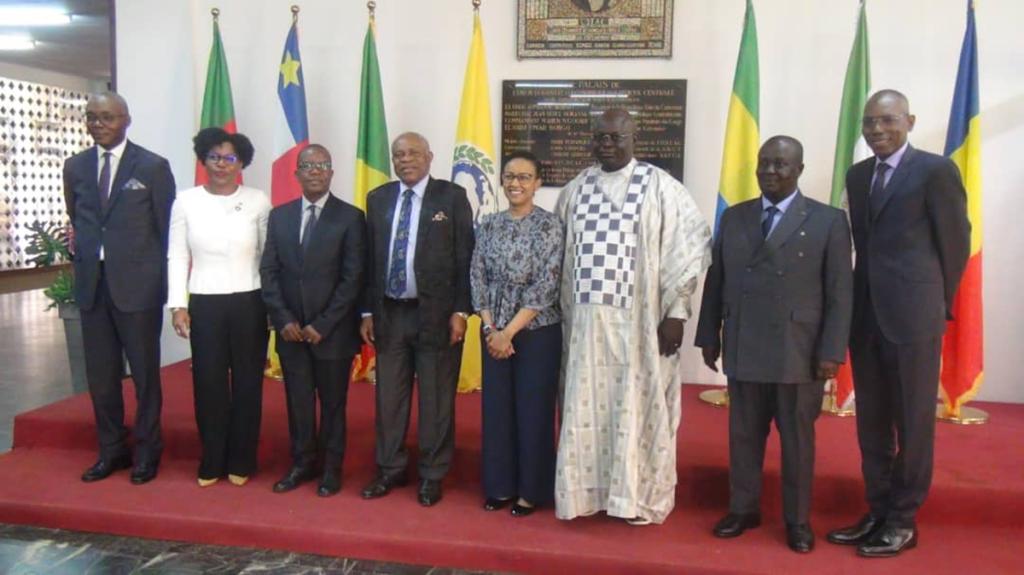Accounting for 90% of businesses and providing 60% of jobs across the continent, small and medium-sized enterprises (SMEs) form the backbone of Africa's economy. SMEs hold the promise of driving economic recovery, diversification, and industrialization in vulnerable countries like the Central African Republic (CAR), yet they face significant challenges, including limited access to financing, technology, and markets information.
To help overcome these barriers, the UN Trade and Development (UNCTAD) launched an innovative project that aims to enhance SMEs participation in regional value and supply chains. This initiative aligns with CAR’s African Continental Free Trade Area (AfCFTA) national strategy, designed to harness opportunities of intra-African trade.
UNCTAD-UNECA joint national launch workshop
The launch of the project took place in the margins of a joint national consultation workshop organized by UNCTAD, in close collaboration with the United Nations Economic Commission for Africa (UNECA) and the CAR's Ministry of Trade and Industry. Taking place at the United Nations Development Programme offices in Bangui, on 21 November 2024, the workshop brought together more than 30 participants from the public and private sectors, civil society, and development partners.
Setting the stage, M. Jean-Luc Namegabe Mastaki, UNECA's Subregional Director for Central Africa emphasized that "SMEs are vital for GDP growth and job creation but face barriers such as financing and administrative inefficiencies. This project is pivotal in addressing these challenges and ensuring inclusive growth."
In his opening remarks, S.E.M Thierry Patrick Akoloza the Minister of Trade and Industry of CAR, welcomed the initiave, highlighting its timeliness and alignement with the government’s efforts for an inclusive AfCFTA implementation in CAR. “This project aligns perfectly with our national strategy to leverage the AfCFTA for economic diversification and resilience,” he noted. The Minister outlined the government’s commitment to supporting SMEs through business formalization, improved access to resources, and partnerships with professional associations, while acknowledging the persistent challenges in competitiveness, financing, and technology adoption.
Participants from the government, private sector and development partners, during the national consultation workshop on enhancing SME integration into regional value chains, held in Bangui on 21 November 2024
Project objectives and expected outcome
During the workshop, stakeholders have identified value chains such as cassava, coffee, artisanal mining, textiles and renewable energy as promising sectors. However, they also noted persistent obstacles such as limited infrastructure, high trade costs, and lack of market information.
Mrs. Habiba Ben Barka, Chief of Africa Section at UNCTAD, explained “This project aims to help address these challenges by developing digital platforms and trade apps, providing SMEs with real-time market insights and enabling them to compete effectively in regional markets." She presented the project’s implementation strategies entailing: (i) developing and testing statistical, financial, and technological tools for data collection and analysis; (ii) conducting research on industrial policies, value chain mapping, regional market opportunities, and digital/financial technologies; (iii) strengthening partnerships for cross-border trade expansion and regional industrial hubs under the AfCFTA; (iv) facilitating national and regional policy dialogues and peer learning through workshops and consultations; and (v) providing targeted training programs and market-entry strategies for SMEs. UNCTAD and ECA further noted that through the successful implementation of the project SMEs will gain improved capabilities in production, technology, and business management.
Recognizing their critical roles in production, yet prevalence in the informal sector, emphasis was also placed on empowering women and youth. Addressing these barriers, the project aims to formalize their economic inclusion, enhancing access to financing and markets.
High-level delegates from UNCTAD, UNECA, and CEMAC at the conclusion of strategic discussions in Bangui.
As part of the broader national consultations in CAR, UNCTAD and UNECA held high level meetings, in parallel with the launch workshop, with the Ministry of Economy, Planning, and International Cooperation (MEPIC) and the Central African Economic and Monetary Community (CEMAC). Discussions with S.E.M Richard Filakota, Ministry of Economy, Planning, and International Cooperation, emphasized aligning the SME project with CAR’s National Development Plan (PND), focusing on building SME technical capacities and competitiveness.
The meeting with CEMAC president, S.E.M Baltasar Engonga Edjo'o, highlighted Special Economic Zones (SEZs) as critical for industrial transformation, economic independence, and job creation. The meeting also explored strategies for developing transboundary SEZs, mobilizing financing from regional banks, and strengthening value chains in key sectors such as timber.
Moving forward
The launch of this project marks a significant step towards realizing CAR’s vision of building a strong SMEs ecosystem as a foundation for economic diversification under the AfCFTA. By aligning national strategies with regional initiatives and leveraging innovative tools, CAR aims to unlock new opportunities for its SMEs, fostering sustainable development and resilience in a challenging political and economic landscape.
The project is funded by the 2030 Agenda for Sustainable Development Sub-Fund of UN Peace and Development Trust Fund of UNDESA, PDF-SDG-2023-08
The private sector, specifically small and medium-sized enterprises (SMEs), is critical to Africa’s economic diversification and competitiveness. However, in vulnerable economies like the Central African Republic (CAR), SMEs face several challenges, limiting their access to regional markets and potential for growth.
To address these challenges, UNCTAD, in collaboration with other UN partners, has developed a project to enhance SMEs’ participation in regional value chains. In CAR, the project will provide insights into tools and policies for industrial agglomeration, research on value chains, and digital and financial technologies to foster regional trade clusters and high-value industrial hubs under the African Continental Free Trade Area (AfCFTA).
The national consultation workshop in CAR, organized jointly with UNECA’s Central Africa Subregional Office and the Ministry of Trade and Industry, aims to advance the country's AfCFTA strategy, focusing on enhancing SMEs’ integration into regional value chains. This collaborative event aims to engage key stakeholders in the public and private sectors and to foster discussions on policies and incentives that facilitate SMEs’ access to critical market information, technology, and resources to better equip them for regional trade and industrial growth under the AfCFTA.



